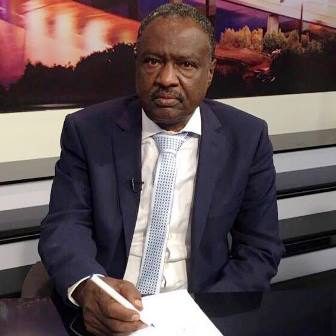
By: Rashid Abdul Raheem
We entered the presidential palace in the Eritrean capital, Asmara, and were warmly received. Moments later, we were ushered into the office of President Isaias Afwerki, who greeted us at the door. We were a group of ten journalists.
As per protocol, I extended my hand in greeting and introduced myself, saying, “I am Rashid.” He completed my name, saying, “Rashid Abdul Raheem, from the ‘Signals’ column.” This was his approach with all my colleagues—demonstrating full and accurate knowledge of who we were.
For three hours, we realized that the man was a meticulous follower of Sudanese media and all its affairs. He displayed an in-depth understanding of Sudan’s political, social, and economic issues, as well as trade dynamics.
During those days, his Excellency hosted numerous official and public Sudanese delegations, including artistic groups, government figures, and popular representatives from eastern Sudan.
I, along with other journalists, witnessed his deep affection for Sudan and his strong ties with it since the fall of Mengistu Haile Mariam’s regime in Addis Ababa. This was during our visit to monitor developments in the formation of the two states, Eritrea and Ethiopia.
During that visit, he made several trips to the residence of the Sudanese ambassador in Addis Ababa, where the candidate for our embassy in Eritrea was present.
He maintained a strong connection with Sudan. His relationship with the distinguished ambassador Majid Youssef—may he rest in peace—was profound and enduring, more of a friendship than a formal diplomatic connection.
The late ambassador Majid Youssef was a kind and active individual who strengthened ties between the two countries, organized numerous official and public visits, and established the “House of Sudan” with its many activities.
It was not surprising, then, that Eritrea opened its borders and land to all Sudanese who came during the outbreak of war, without requiring visas, residency permits, or any fees for education or medical treatment.
The doors of Eritrean homes also opened, welcoming Sudanese with brotherhood and warmth.
Freedom Street, which had previously hosted performances by prominent Sudanese artists during Eritrea’s independence celebrations, recently witnessed rallies in support of the Sudanese Armed Forces and people. These events were attended by both President Isaias Afwerki and General Abdel Fattah al-Burhan.
Since the onset of the conflict, Eritrea and its president have taken strong and clear stances in solidarity with our people and army against the rebellion.
These genuine, sincere positions were not driven by self-interest or ambition; instead, Eritrea endured significant challenges and went above and beyond in its support.
While Eritrea remained steadfast in its loyalty and support, many neighboring countries quickly turned to hostility, betrayal, and schemes—lured by the wealth flowing in to fuel the war and incite hostilities. Even brothers turned their backs on us, seeking gains from wealthy nations and support from major powers eager to stir international pressure against us.
Eritrea stood firmly by us, fully aware of the ferocity of the targeting it might face. Yet, it rose above short-term gains and refused to betray its bond of brotherhood. It proved to be a true friend in both hardship and prosperity, thwarting every attempt to exploit its territory as a gateway against us.
Eritrea stood by us as a sincere, loyal, and noble friend—offering unwavering support without expecting anything in return.



